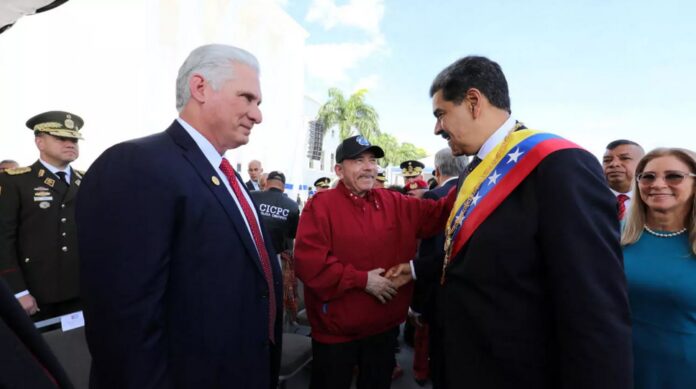
By Andres Kogan Valderrama
HAVANA TIMES – With much concern and sadness, we witnessed Nicolas Maduro assume a new term as president of Venezuela, following a scandalous fraud, while much of the global left looks the other way and says nothing about it. This is with the exception of figures like Gabriel Boric, Gustavo Petro, and Lula da Silva, who have criticized what is happening in that country.
It is difficult to understand how various parties, organizations, intellectuals, and activists who are committed to building a more just world are unable to raise their voices against a dictatorial regime that has censored, persecuted, imprisoned, tortured, and killed those who protest within Venezuela.
Moreover, their silence persists despite the regime having created deplorable conditions for its population, forcing millions to leave the country in search of hope for a better life elsewhere, traveling thousands of kilometers and enduring all kinds of vulnerabilities and lack of protection in their destination countries.
Thus, while not many in the global left openly celebrate or defend this new term of Maduro, there are also very few who criticize what is happening there. It is as though simply doing so would label them as coup-supporters, imperialists, right-wingers, or mere pawns of US geopolitical interests.
It seems that many are aware of what is happening in Venezuela, but fear of playing into the hands of the right has outweighed their willingness to speak out. Instead, they have chosen to remain silent, becoming passive accomplices to the brutal concentration of power and authoritarianism, all in the name of socialism and revolution.
We recently saw a similar pattern with Vladimir Putin’s invasion of Ukraine and Bashar al-Assad’s tyranny in Syria, as well as historically with the brutalities committed by so-called real socialism. Silence has often been the response, while millions of human beings have been punished for thinking differently or opposing the dictator in power.
Of course, it is ideologically more comfortable to criticize only Israeli colonialism against the Palestinian people, right-wing Latin American dictatorships, and US interventionism throughout history. These are uncontroversial positions, requiring no self-reflection, leaving critical thinking aside.
In other words, many leftists find it much easier to present themselves solely as anti-Zionist, anti-imperialist, or anti-fascist. These enemies are clear and well-defined, requiring no deep reflection about one’s political beliefs or how they relate to practice, especially within the algorithm-driven context of social media that discourages questioning one’s certainties.
That said, the Venezuelan political process must be demystified, and the left-wing mythology surrounding it needs to be set aside. Only by doing so can we critically assess what led to the current situation under Nicolas Maduro.
This means acknowledging the early days of the Bolivarian Revolution in the late 1990s and early 2000s as a democratizing and hopeful process for Venezuela and the region—an alternative to neoliberalism—without being blinded to what subsequently unfolded over the years.
Thus, valuing Venezuela’s first constituent process and Chavez’s strong push for regional integration does not preclude criticizing the fierce authoritarianism and increasing concentration of power under Chavez and later Maduro. Nor does it ignore their failure to diversify an extractivist economic model entirely dependent on oil.
The results are evident: a bankrupt economy, a corrupt and militarized state, and a dictatorship seemingly determined to persist for many more years. It uses rhetoric about US conspiracies to justify the unjustifiable, even though there is indeed a blockade and the northern country has little interest in the lives of Venezuelans.
Regarding regional integration, unfortunately, organizations like UNASUR and CELAC ended up being merely decorative, tailored to governments like Venezuela’s. They failed to develop serious policies for our countries in economic, socio-environmental, health, migration, anti-corruption, and organized crime matters.
Given this, those of us who aspire to democratize our countries and achieve genuine regional integration must not endorse or remain silent about the humanitarian disaster that has been unfolding for years in Venezuela, out of fear of being accused of being imperialists or pro-US, as has happened to some.
One such example is Venezuelan sociologist Edgardo Lander, who has faced similar accusations. In a recent interview, he stated that what is happening in Venezuela is a new test for the left, comparable to the Soviet Gulag and the Ortega-Murillo government in Nicaragua. He added that much of the global left is failing this test.
Read more from Chile here on Havana Times.




